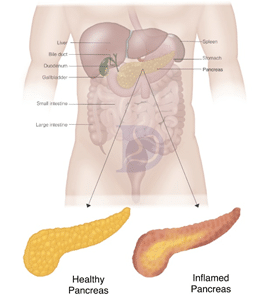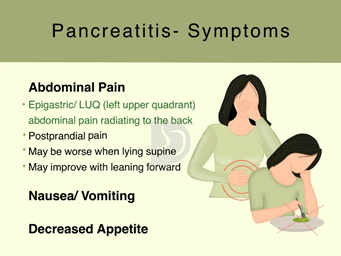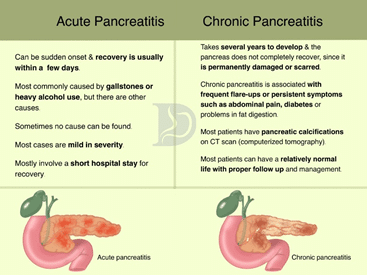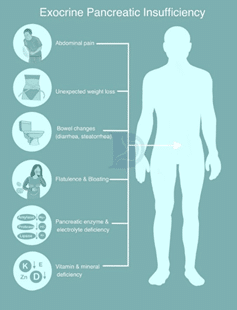The pancreas is located deep in the abdomen behind the stomach. It is often referred to as a "hidden organ." It is around 6–8 inches long in an average adult. The organ contains thin tubes that join to form an opening in the small intestine.
The pancreas produces pancreatic juice and certain enzymes necessary for the digestion and absorption of carbohydrates, fats, and proteins. Moreover, it produces insulin, which is essential in regulating blood sugar levels.1
Diseases of the Pancreas
Diabetes Mellites
Diabetes Mellites is caused when the pancreas cannot produce enough insulin, which is required for glucose to enter body cells. Due to some underlying conditions, insulin-producing cells die off, increasing glucose levels in the blood and urine.2
Effects on the body: High blood glucose levels cause damage to many vital organs, including blood vessels in the eyes, legs, kidneys, heart, and nerves. Sometimes insulin production is normal in the pancreas, but the body cells become resistant to insulin. This type of diabetes is associated with obesity in older adults.
Diabetes can be treated with oral medications that either increase insulin production or alter the cellular insulin response.

Acute Pancreatitis
Acute pancreatitis is the sudden inflammation of the pancreas caused by a variety of things, like:
- Alcohol consumption
- Trauma
- Drugs
- Higher blood cholesterol levels
- Hereditary
Alcohol consumption is one of the most common causes of acute pancreatitis.3 Gallstones also lead to pancreatitis. Trauma and accidents can also lead to this condition. Pancreatitis can be diagnosed through a test called ERCP (endoscopic retrograde cholangiopancreatography).

Symptoms: Acute pancreatitis may exhibit the following signs:
- Severe, sudden pain in the abdomen
- Vomiting
- Fever
Diagnosis: Acute pancreatitis can be diagnosed by elevated pancreatic enzymes. An ultrasound can detect gallstones. A CT exam can be performed to see the inflammation that may be present.
Treatment: Acute pancreatitis is treated by allowing the pancreatic tissue to heal. Medication, IV feeding, and hospitalization can help in this case. If pancreatitis is caused by gallbladder stones, it is usually necessary to remove the gallbladder.
If the pancreatitis persists for a long time, it is referred to as chronic pancreatitis. The primary symptoms are similar to acute pancreatitis. Chronic pancreatitis is usually associated with alcohol abuse.

Pancreas Enzyme Insufficiency
Pancreatic juice contains enzymes required for protein, fat, and carbohydrate breakdown. Pancreatic enzyme insufficiency can occur with pancreatitis or any infection.
If these enzymes are absent, digestion and absorption are affected, leading to diarrhea, weight loss, and malnutrition.4
Pancreatic Tumors
Like any organ, the pancreas can develop stones. Some of the stones can be benign and cause no problem. At the same time, some benign tumors can cause the production of hormones, which may have dangerous effects.
For instance, a tumor may cause excessive production of insulin which may lower the blood sugar level to a dangerous level.5 Similarly, another hormone, gastrin, may lead to elevated levels of hydrochloric acid in the stomach, which may cause peptic ulcers.

Summary
The pancreas plays a vital role in digestion, absorption, and hormone regulation in the body. Several problems may arise in the pancreas either naturally or due to lifestyle choices. There are several methods of diagnosis and treatment available.
References
- A-Kader HH, Ghishan FK. The Pancreas. Textb Clin Pediatr. Published online 2012:1925. doi:10.1007/978-3-642-02202-9_198
- Sapra A, Bhandari P. Diabetes Mellitus. StatPearls. Published online June 26, 2022. Accessed August 9, 2022. https://www.ncbi.nlm.nih.gov/books/NBK551501/
- Gapp J, Chandra S. Acute Pancreatitis. StatPearls. Published online June 21, 2022. Accessed August 9, 2022. https://www.ncbi.nlm.nih.gov/books/NBK482468/
- Ghodeif AO, Azer SA. Pancreatic Insufficiency. xPharm Compr Pharmacol Ref. Published online May 1, 2022:1-5. doi:10.1016/B978-008055232-3.60737-8
- Puckett Y, Garfield K. Pancreatic Cancer. StatPearls. Published online January 21, 2022. Accessed August 9, 2022. https://www.ncbi.nlm.nih.gov/books/NBK518996/

